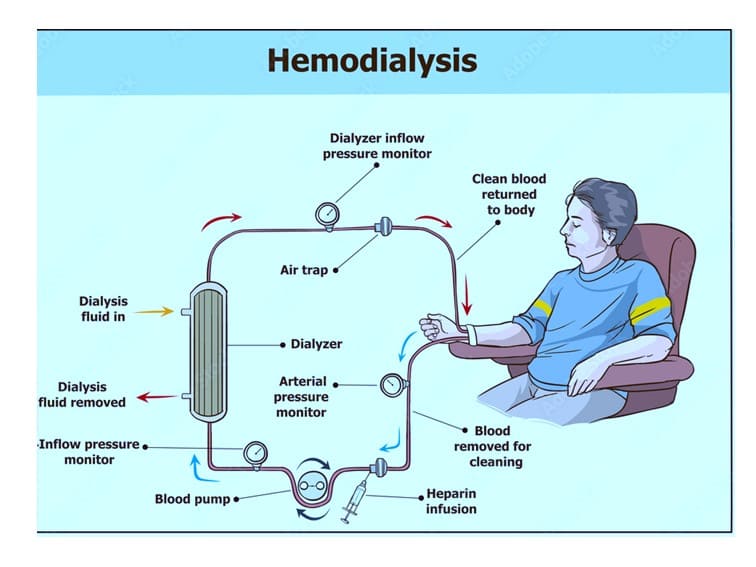Things to do when on dialysis: Hemodialysis is a life-sustaining treatment for individuals with kidney failure. It involves the use of a dialysis machine to filter waste products and excess fluid from the blood. While hemodialysis can significantly improve quality of life, it’s crucial to follow certain guidelines to ensure treatment is effective and minimize complications.
In this article, we will discuss ten things you should do when on hemodialysis to help you maintain your health and well-being.
Things to Do When on Dialysis
- Attending regularly to your Dialysis Sessions
It is important to get your Hemodialysis done regularly as prescribed by your doctor. Skipping or altering these sessions can have serious consequences, When sessions are missed, waste products and fluid can accumulate in the lungs, leading to severe breathlessness, electrolyte imbalances, and heart-related complications. It’s important to prioritize and attend all scheduled dialysis sessions to maintain good health,
- Following Dietary Restrictions
Diet plays a crucial role in the management of hemodialysis. Ignoring dietary restrictions can cause increasing Blood pressure, and fluid accumulation in your body. Your healthcare team will provide guidelines on foods to avoid, including limiting your salt, potassium, and phosphorus intake. By following these recommendations, you can help control fluid levels, maintain electrolyte balance, and improve overall well-being.
- Take your Prescribed Medications
Medication adherence is essential for any medical condition, more so if you are on dialysis. Regular medications are needed to control blood pressure, and injections to improve anemia. Skipping doses or not taking medications as prescribed can lead to complications and will make you feel unwell. Make sure to follow your prescribed medication regimen and discuss any concerns or side effects with your doctors so medication can be altered.
- Fluids
Fluid restriction is a critical aspect of hemodialysis treatment. Excessive fluid intake can lead to leg swelling, excess fluid in the lungs, high blood pressure, and increased strain on the heart. It’s important to adhere to the recommended fluid allowance provided by your healthcare team. Monitoring and managing fluid intake can help improve your well-being on dialysis and improves dialysis efficiency.
5. Neglecting Vascular Access( Fistula) Care
Proper care and maintenance of your fistula are vital to ensure uninterrupted hemodialysis. Neglecting access to care increases the risk of infections and complications. Keep the access site clean and follow the guidelines provided by your healthcare team. Report any signs of infection or abnormalities to your healthcare provider promptly.
6. Engaging in Physical Activity
Physical activity is important for overall health and improves your muscle strength and bone health. Doing gentle exercises during hemodialysis can improve your dialysis efficiency. It’s essential to strike a balance between dialysis and staying active Consult your healthcare team to determine suitable activities and exercises that align with your treatment.
7. Do not Ignore Signs of Infection or Complications
Hemodialysis patients are at a higher risk of infections and complications. It’s crucial to be vigilant and promptly address any signs of infection, such as redness, swelling, or pain over the fistula site or fever, or cough Additionally, be aware of other potential complications, such as low blood pressure, sweating, and chest pain during dialysis. Timely medical attention can help prevent the worsening of complications
8. Stop Smoking and Alcohol Consumption
Smoking and alcohol consumption can have detrimental effects on your health, particularly when you are on hemodialysis. Smoking damages blood vessels and increases the risk of cardiovascular problems. Alcohol can interact negatively with certain medications and contribute to fluid imbalances. Quitting smoking and limiting alcohol intake can significantly improve your well-being.
9. Mental and Emotional Well-being
Living with hemodialysis can bring emotional and psychological challenges. It’s essential to prioritize your mental and emotional well-being. Seek support from friends, family, or support groups to help cope with the lifestyle changes and emotional stress. Engaging in activities you enjoy and practicing relaxation techniques can also contribute to your overall well-being.
10. Attend regular medical Appointments
Regular follow-up appointments with your healthcare team are crucial for monitoring your health and making necessary adjustments to your treatment plan.
Missing or disregarding these appointments can lead to worsening complications and compromise your overall care. Make sure to attend all scheduled check-ups and communicate any concerns or changes in your condition to your healthcare provider.
Conclusion
Following these ten guidelines is essential for individuals on hemodialysis to optimize their treatment outcomes and maintain their health and well-being. By adhering to the prescribed dialysis sessions, dietary restrictions, medication regimens, and lifestyle recommendations, you can effectively manage your condition and minimize complications. Remember these things to Do When on Dialysis. In addition, stay informed, seek support, and prioritize self-care to lead a fulfilling life while on hemodialysis.

Leave a Reply